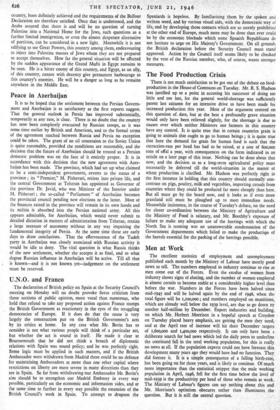The Food Production Crisis
There is not much satisfaction to be got out of the debate on food- production in the House of Commons on Tuesday. Mr. R. S. Hudson was justified up to a point in accusing his successor of doing too little and too late, for the general world-shortage was sufficiently patent last attumn for an intensive drive to have been made fot increased production this year. Most of the argument centred on this question of, date, but at the best a profoundly grave situation would only have been relieved slightly, for the shortage is due to causes over which neither Ministers nor farmers in this country have any control. It is quite true that in certain countries grain is going to animals that ought to go to human beings ; it is quite true that here the demand for grain for human food is such that the extraction-rate per head has had to be raised, at a cost of 600,000 tons of offal a year, with consequences on the farm indicated in an article on a later page of this issue. Nothing can be done about that now, and the decision as to a long-term agricultural policy must necessarily be deferred till the world-situation in the matter of wheat production is clarified. Mr. Hudson was perfectly right in the first instance in holding that this country should normally con- centrate on pigs, poultry, milk and vegetables, importing cereals from countries where they could be produced far more cheaply than here. But all must go by the board now, and it looks as if even more grassland still must be ploughed up to meet immediate needs. Meanwhile insistence, in the course of Tuesday's debate, on the need for closer co-ordination between the Ministry of Agriculture and the Ministry of Food is salutary, and Mr. Boothby's exposure of failure to make any adequate use of the herrings with which the North Sea is teeming was an unanswerable condemnation of the Government departments which failed to make the production of the barrels essential for the packing of the herrings possible.


























 Previous page
Previous page